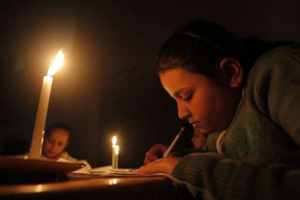The shortage in electricity and fuel has reached a crisis point in the Gaza Strip. The electricity cuts have exacerbated Gaza’s already-deteriorated humanitarian conditions and human rights situation. The electricity cuts have directly effect on the supply of food and medicine to population.
- Since the beginning of 2012, 16 Palestinians have died from burns with an additional 9 people injured.
- Power cuts hinder access to basic human rights.
- Service sectors must be kept out of political disagreements
 ِAl-Mizan for human rights reported – In the evening of Friday, 1 November, 2013, officials from the Gaza Strip’s electric power plant announced that the plant would cease operations due to the exhaustion of fuel supplies. The plant supplies Gaza with 40% of its electricity with the balance coming from Israel and Egypt. The available supply in Gaza generally reaches approximately 210 megawatts, while the need is over 350 megawatts.
ِAl-Mizan for human rights reported – In the evening of Friday, 1 November, 2013, officials from the Gaza Strip’s electric power plant announced that the plant would cease operations due to the exhaustion of fuel supplies. The plant supplies Gaza with 40% of its electricity with the balance coming from Israel and Egypt. The available supply in Gaza generally reaches approximately 210 megawatts, while the need is over 350 megawatts.
With the suspension of the electricity plant, the available supply is now 150 megawatts. As a result, the last two weeks in Gaza have seen a further, critical decline in electricity supplies. The electricity cuts have steadily increased now lasting between 12 and 18 hours per day, with the cuts largely covering daylight hours. The current electricity schedule gives each of Gaza’s five districts a cycle of 6 hours of electricity followed by 12 hours without.
Along with the negative psychological impact of electricity cuts on the people of Gaza the cuts have also led to the deaths of 16 people since the beginning of 2012, including fourteen children. Of the nine people who sustained burn injuries, five were children.
The electricity cuts additionally have serious impacts on access to basic human rights and service sectors in Gaza. The black outs prevent people from realizing their right to health as the medical services, including dialysis centers, surgical operating rooms, intensive care units, and blood banks, all rely on electricity supplies. The sewage treatment plants and residential water mains equally require electricity to run.
The municipalities now turn on the water pumps only at specific times, which are not coordinated with the hours of electrical supply. As a result, water may not reach homes in certain areas for hours and sometimes days on end. The lack of water in homes impacts negatively on family life, public sanitation and has consequences for the environment overall. As follows, the electricity cuts impact on the right to education as schools also require the services that electricity supplies.
The Al Mezan Center for Human Rights emphasizes the necessity of keeping basic service sectors out of the current political disagreement and dually reiterates its previous calls for the provision of the electricity plant’s much needed fuel.
Al Mezan reiterates its condemnation of the Israeli siege imposed on the Gaza Strip, which hinders the population’s access to basic goods and services and warns of the possibility of a further, critical decline if fuel is not supplied and access to services and institutions is not provided.
 ِAl-Mizan for human rights reported – In the evening of Friday, 1 November, 2013, officials from the Gaza Strip’s electric power plant announced that the plant would cease operations due to the exhaustion of fuel supplies. The plant supplies Gaza with 40% of its electricity with the balance coming from Israel and Egypt. The available supply in Gaza generally reaches approximately 210 megawatts, while the need is over 350 megawatts.
ِAl-Mizan for human rights reported – In the evening of Friday, 1 November, 2013, officials from the Gaza Strip’s electric power plant announced that the plant would cease operations due to the exhaustion of fuel supplies. The plant supplies Gaza with 40% of its electricity with the balance coming from Israel and Egypt. The available supply in Gaza generally reaches approximately 210 megawatts, while the need is over 350 megawatts.









No comments:
Post a Comment